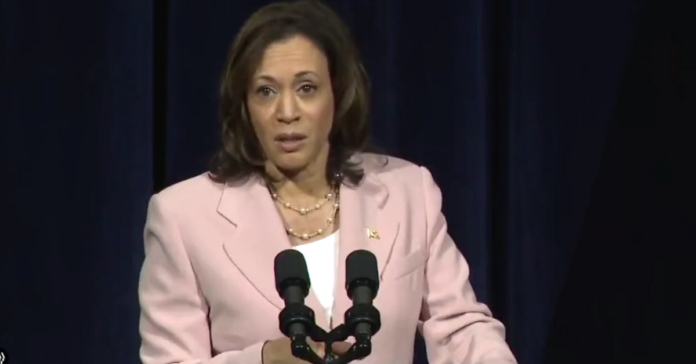White House Cleans Up Kamala Harris’ Terrifying Freudian Slip
VP Kamala Harris made an embarrassing Freudian slip yesterday and the White House had clean up with an embarrassing back-pedal. The claim is that Kamala Harris meant to say reduce “pollution” but she said reduce “population.” (See Video Below)
This is the official transcript: “Today, I am proud to announce the largest investment in financing for community-based climate projects in our nation’s history. (Applause.) It’s a good day.
And one of the reasons that it is so significant is because we also — frankly, we’ve got to make up for lost time. So, by dramatically accelerating our work, we know we can lower emissions.
And we will do that by providing $20 billion to a national network of nonprofits, community lenders, and other financial institutions to fund tens of thousands of climate and clean energy projects across America. (Applause.)
So, here is what that will mean: Okay, so imagine, for example, the construction companies that build affordable housing here in Baltimore that, because of this investment, will now have the capital they need to install energy-efficient appliances in new units, to lower energy use, and to help tenants save on their electric bills.
Imagine, for example, the small-business owner who will now be able to receive zero-interest loans to electrify their fleet of delivery vehicles so we can reduce pollution and save on gas.
Imagine, for example — (applause) — right? Imagine, for example, the house of worship that will now be able to have access to loan guarantees so they can install solar panels on the roof of their building — (applause) — to generate affordable clean electricity for the entire neighborhood. Imagine.
You know, when President Biden and I took office, we set an ambitious goal. Yes, people said, “That can’t be done.” We said, “Well, you know what? We believe in dreaming with ambition and then seeing it thorough.”
And so, we set an ambitious goal to cut our greenhouse gas emissions in half by 2030 and to reach net-zero emissions by 2050. The investment we are announcing today will help us to achieve these goals, and it will do so much more, because think also about the impact on not only the local economy, not only on an investment in the entrepreneurs and innovators from and in the community. Think about the impact on something like public health.
When we invest in clean energy and electric vehicles and reduce population [pollution], more of our children can breathe clean air and drink clean water. (Applause.)
Think of the impact on family budgets. When we help folks upgrade their heating and cooling systems, we lower the cost of electricity, which means lower energy bills for working parents so they have more money for groceries and home repairs and school supplies.
And think of all the jobs that these investments will create, including many good-paying union jobs. (Applause.) Jobs, for example, for the workers of IBEW who will install energy-efficient lighting. (Applause.) Jobs for the sheet metal workers who will replace gas furnaces with electric heat pumps. (Applause.) Jobs for the laborers who will build net-zero housing. (Applause.) Right.
So, understand, when the President and I invest in climate, we intend to invest in jobs, invest in families, and invest in America.
And this investment is also about a partnership with the private sector. You know, my whole career, I have believed in the power of public-private partnerships. I have seen how much more we can accomplish when we combine the experience and expertise of the private sector with the reach and the scale that only the government can provide.
And as the business leaders here today can confirm, this investment is an incentive — this public investment is an inventive by design for billions more dollars from the private sector.
And in all this work, we have put a special focus on communities that have been historically left out and left behind. The climate crisis impacts everybody, but it does not impact all communities equally.
She said the quiet part out loud. Wow. https://t.co/ieaT1zjQrx
— Tomi Lahren (@TomiLahren) July 14, 2023
